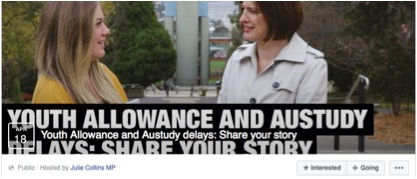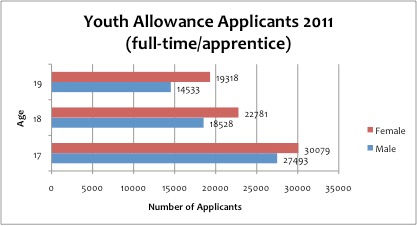Parental Threshold Disadvantages Youth
- ashleighdwan

- Jun 7, 2016
- 4 min read
The four-month backlog of the federal government’s Youth Allowance and Austudy payment scheme has infuriated Australian University students, sparking controversy over Centrelink’s tough eligibility criteria.
An outcry of students turned to social media to release their anguish on the tough criteria after Shadow Minister for Employment Services, Julie Collins, held an online Facebook forum surrounding the processing delays.
“I held an online forum to better understand the extent of the issues facing students.
“How can we expect students to get a good education or trade to be able to work, when they can’t afford to feed themselves,” she said.

Students are desperate to share their stories on Facebook as they struggle to pay for the bare necessities such as food and rent after the recent payment delays for Youth Allowance and Austudy.
The forum was inundated with comments from students across Australia who failed to qualify for the payments after being turned down due to the parental income threshold.
Frustrated student, Emilie Grincais, shared her anger via the Facebook forum attributing the parental income threshold to the failure of Centrelink’s Youth Allowance scheme.
“The amount of hard working young people in Australia that are rejected by Centrelink due to circumstances involving their parents income is disgusting.
“My parents income has nothing to do with me, they were not able to give me any money to live away from home, therefore I was broke.
“The fact that my parents have worked their entire lives should not have anything to do with my claim,” she said.
A former Entertainment Industries student at the Queensland University of Technology (QUT), Imarney McDonnell, had to defer her degree to make enough money to support herself.

As a result of Centrelink’s tough eligibility for Youth Allowance, students have to choose between University and making enough money to support themselves. It’s the piggy bank or the textbooks.
“While I was studying at QUT I was working maybe 10 hours a week, … due to the workload and between my travel, study and other expenses I was making a loss every single week that I went to Uni,” she said.
She is classed as ‘dependent’ according to the Youth Allowance eligibility criteria as she is 18 and lives with her parents, meaning Centrelink requires a personal and parental income and assets test
Youth Allowance Eligibility Criteria & Parental Income Test

[endif]--Her application was denied, finding Imarney was not eligible for any Youth Allowance payments as her parents combined annual income was above the threshold that ranges between $88,000 and $165,000.
Whilst the scheme assesses parental annual earnings it fails to look into the parent’s ability to support their children, their existing debts or the number of other dependent children in their care.
Imarney was forced to drop out of her QUT University degree and look for her own employment after the Jobseeker’s Youth Allowance job agency considered her a low priority applicant.

In Imarney’s case the piggy bank won as she said goodbye to her studies at QUT.
Her story resonates with many Australian University students that face similar circumstances after being told their parents earn too much money.
QUT Bachelor of Mass Communication student, Tayler Farquhar, works 30 hours a week as well as studying full-time to pay her bills.
“As you can imagine it is quite difficult, but I don’t know what I would do without the job I currently have.
“I’m terrified that something will happen to me and I won’t be able to work for a few weeks, as I’m casual I would receive no money,” she said.
Despite not receiving financial help from her parents she is still considered dependant and was not given a specific reason why she wasn’t eligible.
Senior Welfare Officer at QUT, Donna Hughes assists students with their basic living and financial needs, helping them to access support available through Centrelink and the University.
“For some students if parents aren’t able to support them then that criteria becomes quite difficult.
“If they’re not able to get a Centrelink payment that can be a barrier for those students being able to do well at Uni, particularly when students have to work long hours to be able to support themselves,” she said.
Universities Australia released their Australian University Student Finances 2006 Final Report that looks at the issues students face as a result of financial hardship.
Although it was released 10 years ago the statistics are alarming as the survey revealed just over 41 per cent of full-time undergraduates had a total annual income of less than $10,000.
The report also found that a large proportion of students that undertook paid work, funding their study-related expenses, had significant adverse effects on the quality of their studies.
The Australian government released an income support overview in 2011, revealing the ages of full-time University students and apprentice’s eligible and receiving payments for Youth Allowance.

The graph shows the decline for both males and females, as they progressively get older.
The overview also reported the weekly income of the applicants, showing the majority is not working or not receiving money from their employment.
This graph shows that 70.9% of the total recipients are not receiving a weekly income.

This graph shows that 70.9% of the total recipients are not receiving a weekly income.
Donna Hughes encourages QUT students to apply for the equity scholarships as well as talking to a welfare officer about that realistic balance between work and Uni.
“If students are having some sort of crisis situation then we would assess for the emergency assistance.
“Sometimes people are in causal work, which if you’re sick you can’t work … can put pressure on students as well,” she said.
Queensland students with questions on relevant legislation and Centrelink eligibility criteria can contact Basic Rights Queensland (BRQ), a part of the National Welfare Rights Network.
“In cases where a person is very vulnerable, for example homeless, escaping domestic violence or with serious mental health issues, BRQ may be able to open a file to provide advocacy and in some instances, representation,” a spokesperson for BRQ said.
BRQ work with the government to improve laws, policies and procedures with a view to ensure Queensland’s social security system is fair and accessible.
The Human Services Department, charged with the responsibility of delivering welfare payments, and the Minister for Human Services, Alan Tudge were contacted for this story but declined to comment.
![endif]--
Comments